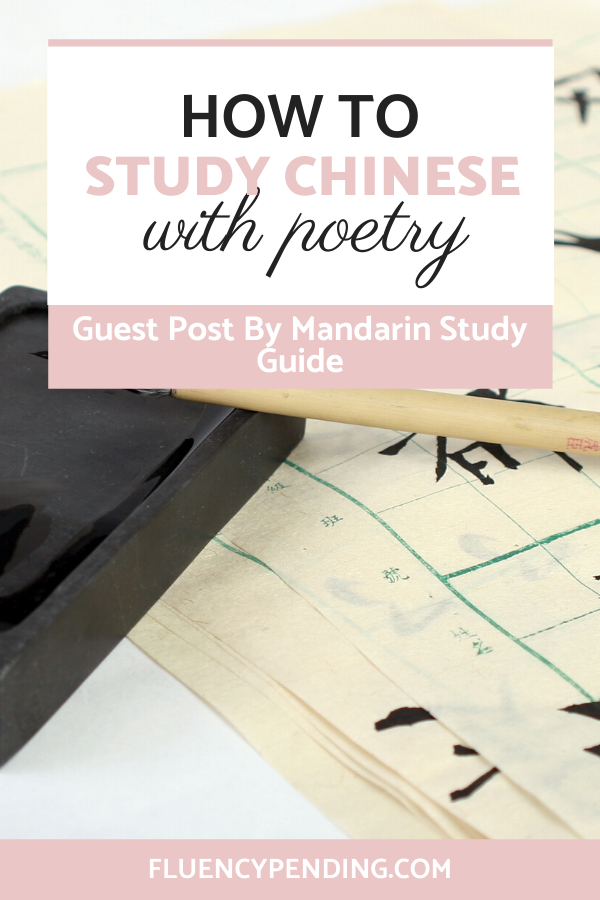
Guest Post: Why and How You Should Be Studying Chinese Poetry
Are you trying to spice up or supplement your Chinese language learning? Try reading poetry. While the art form has received a reputation for being dull in recent years, it is a great way to learn a foreign language. Poetry places language in context, instills a deeper language sense in readers, connects language to culture, and cements linguistic patterns in learners’ minds. For Chinese in particular, poetry offers a window of understanding into what can often feel like an archaic language.
Poetry works best when situated within a solid language learning strategy, it alone will not teach you Chinese. Poetry cannot replace textbooks, novels, and teachers. However, let’s be honest – textbooks, novels, and teachers can be a drag at times. Poetry is digestible and fun where traditional language learning can be slow and dry.
Why you should study Chinese poetry
Memorability
Songs and poems stick in our minds, science has proven this. In double-blind studies, poignant turns of phrase and rhythmic lines are nearly two times more memorable than sanitized textbook sentences. Imagine if you could apply your near-perfect passive memorization skills for songs like The Macarena to your language learning – this is what poetry can do for you. Poets labour over single lines of text, perfecting them until they become tiny, pre-packaged language units that you can recall and flexibly deploy.
Applicability
Poetry reading is unique. It is a close reading of authentic texts that requires high-levels of consideration, focus, and textual analysis. Reading poetry in Chinese challenges non-native readers to consider the gaps between linguistic input and output, extending their understanding of the potential uses and meanings of existing linguistic structures. Poets use linguistic flexibly in their art and reading their works helps impart this same flexibility to learners. Reading poetry teaches readers how to apply what they’ve already learned.
Rhythmicality
Chinese is a beautiful and rhythmic language, but this can get lost in the midst of one’s studies. However, at a high level, this rhythmicality is needed for fluency.
It is impossible to forget the feel of a language with poetry. The artform is centered around sound and style. Reading Chinese poetry out loud in particular reveals what native speakers find beautiful about Mandarin. Poets play not only with syllables and rhymes like in English, but also with tones. Read a few Chinese poems out loud and you’ll quickly pick up on a speaker’s penchant for preceding fourth tones with second tones rather than other fourths. Read a few more and your pronunciation and language sense will both be greatly served.
Cultural Connectivity
Language and culture are so deeply interrelated that it is impossible to study one without learning about the other. Studying poems from the 2,000+ year-old Chinese poetic tradition teaches about both. Poetry is ingrained in Chinese scholasticism and students from the Qin dynasty until today have been required to memorize a canon of famous poems. Tons of references, idioms, and linguistic idiosyncrasies all have roots in poetry. (Ever wondered where most chengyu come from? Look no further than poetry.) Poems are not only authentic native texts, but they are often THE authentic native texts – the sources of idioms and references, not just sites that utilize them correctly.
Digestibility
Most poems are short. Reading a 1,000-page novel is a daunting task in English let alone in Chinese. Poems offer learners the opportunity to plan discrete, achievable lessons and goals. More importantly, poems aren’t as dense as novels and textbooks. Learning via poetry is not about spending painstaking time looking up hundreds of unknown words. Learning via poetry is about discovering how to treasure the language you are learning. How to beautifully and fluently apply what you have already learned – new vocabulary words that you pick up along the way are just a bonus!
Confidence
Have you ever told someone that you speak Chinese fluently when you’re drunk? That’s a product of confidence. At a point in our language learning careers we need to take off our training wheels, stop stressing about technicalities, and run with what we know. Poetry builds learner confidence and helps you run wild. Not only is learning poetry a study in linguistic freedom, it’s an achievement. Understanding cultural references, knowing the source of chengyu, learning poem after poem, feels like conquering the world. Poetry will not teach you how to ask where the carrots are in the grocery store. It will give you the confidence to ask where they are.
How to study poetry
Before you even look at a poem, you’ll want to set SMART learning goals and establish a study schedule. Ultimately, you want to progress through significant, yet achievable, goals on a timeline that won’t lead to burnout. For example, I dedicate 50 minutes every week to learning one new Chinese poem; this makes me feel accomplished without ever being overwhelmed.
For learning individual poems: after an initial read, write down and learn any new vocabulary that you encounter, you want to immediately proceed to strict memorization. This is how Chinese poetry has been taught for the last 2,000 years and how you will best insert yourself into the linguistic tradition. Anki is an amazing tool for memorization, although I find that physically writing out the poem a few times before moving to flashcards is extremely helpful. Luckily, as discussed before, poems are much easier to memorize than random sentences!
More importantly, you should be reading secondary scholarship that analyzes both the poem’s content and language. This is where all the perks of learning poetry come into play. Deep understanding of a poem offers insight into Chinese culture, and thorough understanding of a poem’s structure improves one’s language sense. I find translation critiques particularly insightful. In looking at what is lost in translation, students learn what makes Chinese unique. To see where Chinese speaks when English goes silent. This type of language sense is the hardest to attain and this is what poetry offers.
Resources
I’d recommend starting with famous poems before branching out – this will guarantee that you will be able to find high quality secondary scholarship on GoogleScholar. I personally stuck to Li Bai and Du Fu for my first year studying poetry. 小池 and 静夜思 are great options to start with.
Chinese Poems is a free online resource that offers readers hundreds of poems with translations to pick between. Learn Chinese Poetry is another great free option; while the site only covers 9 poems it offers extremely detailed line by line analysis for each poem. If you really want to commit to learning Chinese poetry, Stanford University offers a free online course on classical Chinese poetry.

Dale MacLean is the founder of Mandarin Study Guide, a language learning blog dedicated to helping readers hack their lives and learn Chinese as efficiently as possible. Check out some of MSG’s free lessons on learning Chinese through music, literature, and art here. You can catch Dale searching for the best ramen in NYC during his free time. Follow him on Pinterest or Reddit to receive Mandarin Study Guide’s newest tips and tricks on learning Chinese.





4 Comments
Jennie
January 18, 2021 at 7:59 am
This is super helpful! One question, the Stnaford University course seems to link to classical Chinese (e.g. Analects, Mencius, etc). Is there a poetry course that you’re aware of? I wasn’t able to find it. 多谢帮助!
Elzette
January 18, 2021 at 8:59 am
Hi Jennie. I’ll check with Dale (the author of the post) on this. I found this course on Udemy, which may be of interest: https://www.udemy.com/course/the-immortal-classical-chinese-poetry-season-1/
McKenna
December 23, 2021 at 1:41 pm
Are there any resources for Japanese poetry?
Elzette
January 14, 2022 at 12:06 pm
Hi McKenna, Japanese isn’t currently one of my target languages, but you could try asking on online language communities such as iTalki or Reddit (try r/LearnJapanese). Good luck with your studies!
Comments are closed